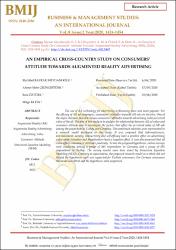An empirical cross-country study on consumers’ attitude towards augmented reality advertising
Abstract
The use of AR technology for advertising is becoming more and more popular. For the efficacy of AR ad campaigns, consumers' attitudes towards AR ads are decisive. One of the major elements that determines consumers’ attitudes towards advertising is the perceived value of the ad. the aim of this study is to analyze the relationship between AR ad value and consumer attitude and to investigate the factors that affect the perceived value of AR ads among the youth both in Turkey and Germany. the mentioned relations were represented in a research model developed in the study. It was proposed that informativeness, entertainment, novelty, interactivity and self-efficacy have a positive effect on advertising value while irritation and deceptiveness have a negative effect. It was also proposed that ad value affects consumers’ attitudes positively. To test the proposed hypotheses, online surveys were conducted among a group of 365 respondents in Germany and a group of 391 respondents in Turkey. the survey results were then tested by Structural Equation Modeling (SEM). Contrary to expectations, the proposed research model as a whole did not fit and the hypotheses were not supported for Turkish consumers. For German consumers the model was fitted and the hypotheses were supported. Reklamlar için artırılmış gerçeklik (AR) teknolojisi giderek daha popüler hale geldi. Artırılmış gerçeklik reklam kampanyalarının etkinliği için, tüketicilerin artırılmış gerçeklik reklamlarına karşı tutumları belirleyicidir. Tüketicilerin reklama karşı tutumlarını belirleyen temel unsurlardan biri reklamın algılanan değeridir. Bu çalışmanın amacı, bir artırılmış gerçeklik reklamının değeri ile tüketici tutumu arasındaki ilişkiyi analiz etmek ve Türkiye ve Almanya'daki gençler arasında artırılmış gerçeklik reklamlarının algılanan değerini etkileyen faktörleri araştırmaktır. Söz konusu ilişkiler, çalışmada geliştirilen bir araştırma modelinde temsil edilmiştir. Çalışmada bilgilendiricilik, eğlence, yenilik, etkileşim, öz-yeterliliğin reklam değeri üzerinde olumlu bir etkisi olduğu ileri sürülürken rahatsız edicilik ve aldatıcılığın olumsuz etkisi olduğu ileri sürülmüştür. Reklam değerinin tüketicilerin tutumlarını olumlu etkilediği de önerilmiştir. Önerilen hipotezleri test etmek için, Almanya'da 365 katılımcıya, Türkiye'de 391 katılımcıya çevrimiçi anket uygulanmıştır. Anket sonuçları daha sonra Yapısal Eşitlik Modeli (SEM) ile test edilmiştir. Beklentilerin aksine, bir bütün olarak önerilen araştırma modeli Türk tüketicilere uymamış ve hipotezler Türk tüketiciler için desteklenmemiştir. Alman tüketiciler için model sağlanmış ve hipotezler desteklenmiştir.

















